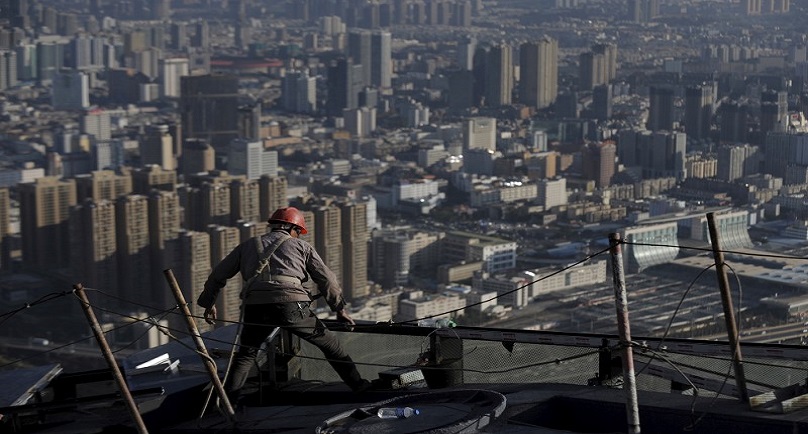Image: A labourer works atop a construction site of a commercial building as residential complexes are pictured in the background, in Kunming, Yunnan province, China, December 12, 2015. REUTERS/Wong Campion
By David Lawder
WASHINGTON (Reuters) – The International Monetary Fund cut its global growth forecasts for the third time in less than a year on Tuesday, as new figures from Beijing showed that the Chinese economy grew at its slowest rate in a quarter of a century in 2015.
To back its forecasts, the IMF cited a sharp slowdown in China trade and weak commodity prices that are hammering Brazil and other emerging markets.
The Fund forecast that the world economy would grow at 3.4 percent in 2016 and 3.6 percent in 2017, both years down 0.2 percentage point from the previous estimates made last October.
It said policymakers should consider ways to bolster short-term demand.
The updated World Economic Outlook forecasts came as global financial markets have been roiled by worries over China’s slowdown — confirmed by official Chinese data on Tuesday — and plummeting oil prices.
The IMF maintained its previous China growth forecasts of 6.3 percent in 2016 and 6.0 percent in 2017, which represent sharp slowdowns from 2015.
China reported that growth for 2015 hit 6.9 percent after a year in which the world’s second biggest economy endured huge capital outflows, a slide in the currency and a summer stock market crash.
Shares in Europe and Asia rose and the dollar gained after the China data was released, as investors anticipated greater efforts by Beijing to spur growth.
Concerns about Beijing’s grip on economic policy have shot to the top of global investors’ risk list for 2016 after falls in its stock markets and the yuan stoked worries that the economy may be rapidly deteriorating.
The Fund said a steeper slowing of demand in China remained a risk to global growth and that weaker-than-expected Chinese imports and exports were weighing heavily on other emerging markets and commodity exporters.
“We don’t see a big change in the fundamentals in China compared to what we saw six months ago, but the markets are certainly very spooked by small events there that they find hard to interpret,” IMF economic counselor Maurice Obstfeld said in a videotaped statement.
OVERREACTING
He said global financial markets seemed to be overreacting to falling oil prices and the risk of a sharp downturn in China.
Obstfeld also said it was critical that China is clear about its overall economic strategy, including its currency.
“It’s not a stretch to suggest that (markets) may be reacting very strongly to rather small bits of evidence in an environment of volatility and risk aversion,” Obstfeld said at a news conference.
“The oil price puts stresses on oil exporters … but there is a silver lining for consumers worldwide, so it’s not an unmitigated negative.”
The IMF report said continued market upheaval could also help drag growth lower if it leads to major risk aversion and currency depreciations in emerging markets. Other risks included further dollar appreciation and an escalation of geopolitical tensions.
U.S. investment bank Morgan Stanley said the probability of a global recession this year was as high as 20 percent in a worst case scenario.
Soft consumer demand in the United States and Japan and weakness in emerging markets due to worries over plunging oil and commodity prices and capital outflows from China were among the main risks.
A global recession is loosely defined as growth below the roughly 2.5 percent needed for the world economy to keep up with an expanding population.
The Fund said the outlook for an acceleration of U.S. output was dimming as dollar strength weighs on manufacturing and lower oil prices curtail energy investment. It now projects U.S. economic growth at 2.6 percent for both 2016 and 2017, down 0.2 percentage point in both years from the October forecast.
In Europe, lower oil prices will help support private consumption, so the IMF said it added 0.1 percentage point to its 2016 euro area growth forecast, bringing it to 1.7 percent, where it will remain for 2017.
Brazil will stay mired in recession in 2016, with output contracting 3.5 percent, a 2.5 percentage-point downward shift from the previous forecast, and there will be essentially no growth in 2017 as Latin America’s largest economy struggles with lower Chinese demand.
Obstfeld said the Fund was encouraging monetary policy to remain expansive in some countries, such as Japan and in Europe.
“Where there is fiscal space, more infrastructure spending is certainly something that should be on the table,” he added.
(Reporting By David Lawder; Editing by Meredith Mazzilli and Giles Elgood)
Copyright 2015 Thomson Reuters. Click for Restrictions.


